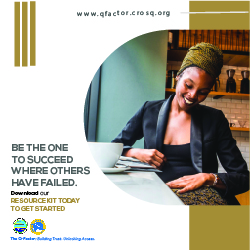What Building the RQI Looks Like
- crosqblog
- on Mar, 06, 2020
- Category CROSQ, Demand for Quality
- Comments Off on What Building the RQI Looks Like
Part 1
Development of Regional Quality Infrastructure, or RQI, is the mandate of the CARICOM Regional Organisation for Standards & Quality (CROSQ). Over the next several months, we will try to bring you an in-depth look at what that means in not just technical jargon, but in practical terms.
CROSQ, which is really a network of national standards bureaux within the region, plus its Secretariat based in Barbados, has worked since its formation in 2002 to “facilitate the development of regional standards, promote the harmonization of metrology systems and support the sustainable production and trade of goods and services in the CARICOM Single Market and Economy (CSME)”.
What that means in practical terms is that the network operates in concert to help each other develop national systems and procedures that will ensure quality becomes a national consideration in every endeavour of development – from the way a service is delivered to way the products are produced. The Secretariat seeks out sources to facilitate this development in a collective manner by providing technical assistance and finding the means of funding national needs using a regional/joint approach.
So at times the technical experts and officials of the Secretariat are found lending their services on the national front or engaging officials at the regional and international levels to fulfil these above objectives.
Already this year, CEO, Mr. Deryck Omar has been in Brussels, attending an African Caribbean and Pacific States (ACP) forum trying to find ways for our region and others to work together.
The second ACP-TradeComII* Knowledge Sharing Event on Trade and Investment Good Practices took place over two days in February 2020 with an aim to disseminate these “good practices” among the more than 100 participants of these regions. CROSQ’s contribution was in a presentation on “Implementing the Technical Barriers to Trade Provisions of the European Union – CARIFORUM Economic Partnership Agreement”.
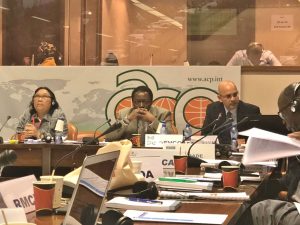
CROSQ CEO, Mr. Deryck Omar (right facing) at his mission in Brussels.
Presentations like these that share the work CROSQ is doing the CARICOM or CARIFORUM region looking at developing our collective competitiveness are not new for the organisation. In fact, they go hand-in-hand with attempts to source development assistance for our national bureaux, whether its financial or technical.
Over the two days, in addition to the presentation to delegate, Mr. Omar also had the opportunity to visit the European Committee for Standardization (CEN), a fellow standardization entity, which it is hoped will open more opportunities for sharing best practices in standardization.
But visits like this to Europe are only a small part of what continually goes into development our quality frameworks and structures. At times, there is also a need for a hands-on approach by some of our technical experts.
Also in late February, the 11th European Development Fund (EDF) Technical Barriers to Trade (TBT) Project funded the visit of Technical Officer – Metrology, Mr. David Tomlinson on a mission to the Bahamas Bureau of Standards and Quality (BBSQ) and the Guyana National Standards Bureau (GNBS) to provide practical technical assistance with training and other areas of the developing weights and measurement infrastructure of both bureaux.
In the Bahamas he was engaged in several activities with staff, while the Guyana trip saw him conducting much needed training for metrologist. Future visits are also scheduled for Dominica, to also assess the nature of assistance that will be needed there.
You can read all about David’s interventions in the second article of this emerging series – [Part 2].
This is also where collaborations with development organisations can prove useful. One such entity that is now in the process of closing out a project with CROSQ is the Caribbean Development Bank.
Over a period of 18 months, the “Strengthening of the Regional Quality Infrastructure” Project, funded by the CDB, has been assisting countries with the development of national quality policies, accrediting laboratories and educating the small business sector about the steps they can take to ensure their products and services meet the kind of quality benchmarks to be accepted regionally and internationally.
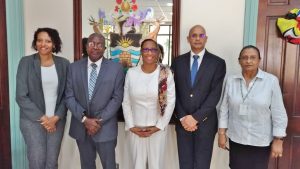
Antigua & Barbuda’s National Quality Policy process gets going.
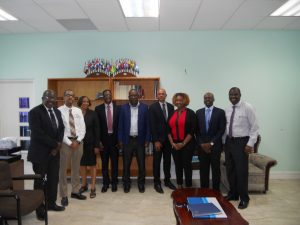
Grenada’s NQP launch.
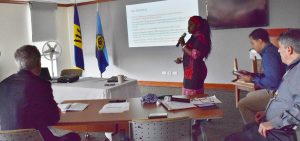
Suriname presenting on the development of its NQP to directors of regional bureaux.
This project, managed by Mr. Terry Hutchinson will close in about a month’s time (March 2020), and has successfully seen quality policies developed in Antigua and Barbuda, Grenada and Suriname; is in the final stages of accreditation for labs in Saint Lucia and Suriname, and saw the completion of a successful digital regional awareness campaign – the products of which can be found and downloaded from the qfactor.crosq.org website.
Activities like these that demonstrate how the concept of developing quality in the region actually takes off. Yet still, this is but a fraction of what goes into building the Regional Quality Infrastructure.
*The aim of the TradeCom II Programme is to “contribute to sustainable economic development and poverty reduction in ACP countries through closer regional integration and increased participation in the global economy”. SOURCE: http://www.tradecom-acpeu.org/page.cfm?title_page=Our-mission




